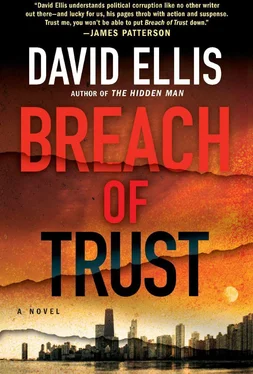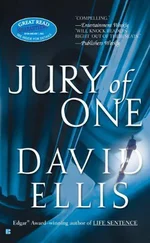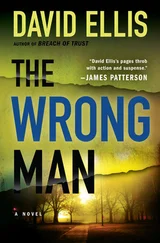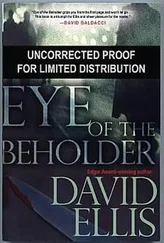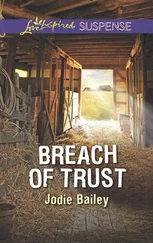David Ellis - Breach of Trust
Здесь есть возможность читать онлайн «David Ellis - Breach of Trust» весь текст электронной книги совершенно бесплатно (целиком полную версию без сокращений). В некоторых случаях можно слушать аудио, скачать через торрент в формате fb2 и присутствует краткое содержание. Год выпуска: 2011, ISBN: 2011, Издательство: Berkley, Жанр: Триллер, на английском языке. Описание произведения, (предисловие) а так же отзывы посетителей доступны на портале библиотеки ЛибКат.
- Название:Breach of Trust
- Автор:
- Издательство:Berkley
- Жанр:
- Год:2011
- ISBN:9780399157103
- Рейтинг книги:4 / 5. Голосов: 1
-
Избранное:Добавить в избранное
- Отзывы:
-
Ваша оценка:
- 80
- 1
- 2
- 3
- 4
- 5
Breach of Trust: краткое содержание, описание и аннотация
Предлагаем к чтению аннотацию, описание, краткое содержание или предисловие (зависит от того, что написал сам автор книги «Breach of Trust»). Если вы не нашли необходимую информацию о книге — напишите в комментариях, мы постараемся отыскать её.
Breach of Trust — читать онлайн бесплатно полную книгу (весь текст) целиком
Ниже представлен текст книги, разбитый по страницам. Система сохранения места последней прочитанной страницы, позволяет с удобством читать онлайн бесплатно книгу «Breach of Trust», без необходимости каждый раз заново искать на чём Вы остановились. Поставьте закладку, и сможете в любой момент перейти на страницу, на которой закончили чтение.
Интервал:
Закладка:
“Jason Ko-LAR-ich!” he said to me, breaking into a broad smile when he saw me. So, I guess he was going to play like he remembered me. It would have helped if he’d checked on the pronunciation of my name before embarking on that plan. Kola, like the drink. Rich, like you have money. How hard is that?
“Great to see you again, Counsel,” he said with a firm grip on my hand.
Somebody must have told him that I’d tried a case before him previously. I wondered if they also told him what I thought of him. Either way, no one bothered to give him the correct pronunciation of my name.
“Thanks for coming, Judge. This won’t take long.”
“Whatever you need, Jason. Whatever you need.”
Great. Terrific. I started with my boilerplate. The governor was considering a wide range of candidates from diverse backgrounds; you’ve impressed a lot of people, you made the first cut, we’re interested in speaking with you, blah blah blah.
“What kind of name is Ko-LAR-ich?” he asked, when I was finished.
“I’m three-quarters Irish,” I said. “But my father’s father was Hungarian.”
“It sounds Polish.”
It wasn’t a question, so I didn’t answer.
“You grew up on the south side?”
“Leland Park,” I said. This guy was interviewing me .
“What was your parish?”
Ah, south-side geography. Identification by the Catholic church you attended.
“St. Pete’s,” I said.
“St. Agnes.” He pointed at himself. “You went to, what, Bonaventure?”
“Right.”
“You spend time at Louie’s?”
“Best kraut dog in the city,” I said. It was just down the way from Bonaventure, my high school.
“Got that right. I went to a ball game last summer, they put ketchup on my hot dog. Ketchup. ”
Sacrilege for a city dog. A lot of people don’t have a sense of humor about such things. Mustard is the only appropriate condiment for a sausage. Budweiser is the only beer at a ball game. On the other hand, I was supposed to be interviewing this guy for a seat on the supreme fucking court, so maybe we should talk about that for at least thirty seconds.
“How would you describe your judicial philosophy?” I asked him.
He watched me for a moment, then broke into a humorless smile. “My judicial philosophy ? My judicial philosophy.” He sat back in his chair, chin up, eyeing me. “You’re interviewing me for this position?”
“Yes, I am.”
“You’re questioning whether I can handle this job?”
“I’m just questioning, period.”
“And you’re going to give a recommendation to the governor?”
“Correct.”
“Mmm-hmm.” He nodded at me. “How long have you been a lawyer?”
“Nine years.”
His expression said it all: What was a kid like me doing evaluating judges? This guy was actually insulted that he’d have to answer questions from me. “I’ve been a judge for seventeen years. I’ve got a record and it speaks for itself.”
Now we’d found common ground. His record definitely spoke for itself. And, if I was reading this idiot correctly, he wasn’t going to be doing any other speaking on the subject.
“Please pass on to the governor how honored I would be to serve on the court.”
“I’ll do that, Judge.”
“And when you write up that recommendation for me-that’s something that will be disclosed publicly?”
“Not sure,” I said.
“Well, if it’s going to be-I’d like to take a look at it first. Make sure it works.”
“I’ll see what I can do.”
“Good.” The judge clapped his hands together. “And now we can say we met?”
“Now we can say that.”
He got up and extended a hand. I took it and gave him my strongest grip, just a quick but hard squeeze. And then my vaunted interview with the honorable George Henry Ippolito was over.
74
Having just conducted a series of sham interviews to name the next justice of the state supreme court, I now moved on to a sham meeting to hear the pleas of a number of people looking to spare the life of Antwain Otis. Madison Koehler had already told me that my assignment was to support the governor’s decision to deny clemency and let the state execute this inmate.
I’d read the considerable file on Antwain Otis twice now and drafted a one-page summary of its contents. His wasn’t a particularly original story. Eleven years ago, while a high-school dropout and member of the Tenth Street Crew street gang, Otis held up a pawnshop on Mayfair Avenue in Marion Park, a south-side community not very far from where I grew up. The owner, after Otis had left the store, ran outside with a firearm that was stowed under his counter and shot at him. Otis sprayed return fire and missed, but his shots killed a woman and her son crossing the street. Clearly, the mother and child were not his intended targets, but the law didn’t care about that. If you intended to fire the gun-which Otis clearly did-you were presumed to have intended to shoot whomever had the misfortune of being in the line of fire. In this case, the victims were Elisa Newberry, age thirty-two, and her five-year-old son Austin.
Otis was convicted of murder and sentenced to death. On direct appeal, the state supreme court upheld the conviction but vacated the death sentence because of improper argument by the prosecution. The high court sent the sentencing issue back to the trial court, where a new jury once again recommended death for Antwain Otis.
Otis couldn’t claim that he lacked adequate representation, as his lawyers had actually beaten the death sentence on the first go-round. Plus, for several years now, Otis had openly admitted to the murders, so legalese aside, no one was claiming a miscarriage of justice. This was no innocent man.
That, of course, was significant. The horror stories involving death-row inmates, the examples most often cited by death penalty abolitionists-a shoddy lawyer who fell asleep at trial or failed to call any witnesses; a prosecutor who withheld exculpatory evidence; a cop who beat a wrongful confession out of an accused-were not present here. Antwain Otis was not denied due process of law. He had good lawyers and a fair trial. And he even now freely admitted he was guilty of the murders. He was not wrongly convicted; in fact, it was entirely fair to say that Antwain Otis was properly convicted and sentenced to death.
The clemency petition filed by Otis’s lawyers did not claim that an innocent man was going to be executed. Their point was that Otis had been rehabilitated and had become a positive force within the prison system. Simply put, Antwain Otis had found God.
I heard that all the time when I was a prosecutor. People found God when their back was to the wall, after they’d lied through their teeth about horrific crimes they’d committed but now were facing a judge for sentencing. But I had to admit that Antwain Otis had a decent story.
With the assistance of local clergy, he started a new prison ministry called You Came to Me in June 2001. The file contained affidavits of twenty-four current and former inmates who’d served with Otis at Marymount Penitentiary, some on death row and others in general population, almost all of them violent offenders. The affidavits, predictably, attested to the impact that Otis and his ministry had made in their lives. Antwain Otis had brought them to God, had taught them the power of faith and forgiveness, had shown them a different path. Eleven of those twenty-four had since been released from prison, and none of them had been reincarcerated for subsequent offenses-a notable statistic, I had to say, given the high rate of recidivism, especially among violent offenders.
But none of that changed the fact that this was an election year, in which a Democratic governor would be sensitive to charges in the general election that he was soft on crime. None of that changed the fact that this man was undoubtedly guilty of the crimes of which he was convicted. None of that changed the fact that Antwain Otis was a black gangbanger who killed an attractive, young white woman and her young son.
Читать дальшеИнтервал:
Закладка:
Похожие книги на «Breach of Trust»
Представляем Вашему вниманию похожие книги на «Breach of Trust» списком для выбора. Мы отобрали схожую по названию и смыслу литературу в надежде предоставить читателям больше вариантов отыскать новые, интересные, ещё непрочитанные произведения.
Обсуждение, отзывы о книге «Breach of Trust» и просто собственные мнения читателей. Оставьте ваши комментарии, напишите, что Вы думаете о произведении, его смысле или главных героях. Укажите что конкретно понравилось, а что нет, и почему Вы так считаете.
